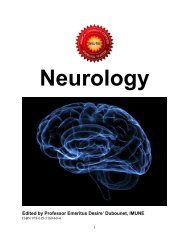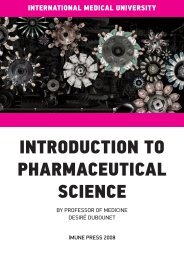You also want an ePaper? Increase the reach of your titles
YUMPU automatically turns print PDFs into web optimized ePapers that Google loves.
• Corticosteroids<br />
• Amphotericin B (Fungizone)<br />
• Antacids<br />
• Insulin<br />
• Fluconazole (Diflucan): Used to treat fungal infections<br />
• Theophylline (TheoDur): Used for asthma<br />
• Laxatives<br />
If you are taking any of these medications, it is important for your doctor to test your potassium<br />
levels to see whether or not you need a supplement. Do not start taking a supplement on your<br />
own.<br />
Other potential interactions include:<br />
Digoxin -- Low blood levels of potassium increase the likelihood of toxic effects from digoxin, a<br />
medication used to treat abnormal heart rhythms and heart failure. Your doctor will test your<br />
potassium levels to make sure they stay normal.<br />
Magnesium Deficiency<br />
The first symptoms of magnesium deficiency can be subtle. Most magnesium is stored in the<br />
tissues, so leg cramps, foot pain or muscle ‘twitches’ are usually the first signs. Insomnia, migraine<br />
headaches are also very common magnesium deficiency symptoms. And if ignored, some of the<br />
other more serious symptoms of Magnesium deficiency (mentioned below) can develop.<br />
Magnesium is one of the most important minerals in the human body and is essential to good<br />
health. It is critical in over 350 essential biochemical reactions in the body including digestion,<br />
energy production, muscle function, bone formation, creation of new cells, activation of B<br />
vitamins, relaxation of muscles, and also assists in the proper functioning of the heart, kidneys,<br />
adrenals, brain and nervous system.<br />
In fact, Magnesium is the fourth most abundant mineral in the body—it can be found in human<br />
bones, teeth and red blood cells, and activates more enzyme systems than both Iron and Zinc<br />
combined. It was as far back as 1971, that Dr Edmund B. Fink (a magnesium researcher at West<br />
Virginia University School of Medicine in Morgantown), recorded in ‘The Executive Health’ that:<br />
• Magnesium deficiency not only exists but is common<br />
• Although it is common, it is often undetected<br />
• Chronic deficiency can produce long-term damage and can be fatal<br />
• The manifestations of the deficiency are many and varied<br />
Low Energy<br />
Magnesium plays a key role in regulating how well the human body converts food into energy.<br />
Metabolism of carbohydrates and fats requires numerous magnesium-dependent chemical<br />
reactions. In 2002, Physiologist Henry Lukaski of the Department of Agriculture’s Human Nutrition<br />
Research Center in North Dakota (USA), established that during moderate activity, individuals<br />
with low magnesium levels use more energy—and therefore tire more quickly—than those have<br />
adequate levels. In this study (published in the May 2002 issue of The Journal of Nutrition) he<br />
elaborates that in the first phase, 10 postmenopausal women were provided with a diet adequate<br />
in magnesium for 35 days, followed by a phase of a low-magnesium diet for 93 days, and in the<br />
last phase once again, they were provided a diet adequate in magnesium for 49 days. It was found<br />
that during the low-magnesium-status phase, the volunteers used more oxygen during physical<br />
activity and their heart rates increased by about 10 beats per minute. “When the volunteers were<br />
low in magnesium, they needed more energy and more oxygen to do low-level activities than when<br />
they were in adequate-magnesium status,” says Lukaski. These findings are consistent with other<br />
studies showing that inadequate magnesium is often associated with a need for increased oxygen<br />
during exercise and people who routinely complain of low energy can benefit from magnesium<br />
supplementation.<br />
Fatigue<br />
Research has suggested that persistent magnesium deficiency may lead to chronic fatigue syndrome<br />
(CFS). When we are magnesium deficient, our bodily functions slow down at the cellular level<br />
causing the body to become sluggish until, eventually fatigue sets in. A path-breaking study (The<br />
Lancet, March 1991) by Cox, Campbell and Dowson of the Centre for the Study of Complementary<br />
Medicine in Southampton, England, recorded that many patients with CFS have low red blood cell<br />
magnesium levels—a more accurate measure of magnesium status than routine blood analysis—<br />
and their condition may improve with magnesium supplements. They injected magnesium sulfate<br />
in a double-blind, placebo-controlled study of 32 patients with chronic fatigue syndrome. Fifteen<br />
patients, randomly chosen, received magnesium sulfate intramuscularly once a week for six weeks<br />
while the remaining 17 received injected water. Patients treated with magnesium showed better<br />
energy levels and better handling of emotions.<br />
Weakness<br />
Between 1965 and 1990 various studies were conducted in New Zealand, Australia, England,<br />
France and the Netherlands to investigate the relationship between prone sleeping position and<br />
the sudden infant death syndrome (SIDS ). A review published in 1991 concluded that magnesium<br />
deficiency (muscle strength is seriously impaired in the young magnesium deficient subject)<br />
is at least one major unifying factor that explains increased SIDS in prone sleeping infants. In<br />
rats, marginal deprivation in dietary magnesium reduces exercise capacity and induces muscle<br />
weakness, an effect that can be rapidly reversed by consuming magnesium.<br />
PMS and Hormonal Imbalances<br />
Premenstrual Symptoms or PMS is a name given to varied physical and psychological symptoms<br />
like abdominal bloating, breast tenderness, headache, fatigue, irritability, anxiety and depression<br />
that occur two to seven days before the onset of menstruation. According to Dr Guy Abraham,<br />
former professor of obstetrics and gynecologic endocrinology at the UCLA School of Medicine,<br />
in most cases of PMS there are patterns of hormone imbalance that can be uncovered through<br />
testing. Carolyn Dean, MD, North Dakota, states that one of the 22 conditions magnesium<br />
deficiency may trigger or cause, is hormonal imbalance leading to premenstrual syndrome (PMS);<br />
dysmenorrhoea (cramping pain during menses); infertility; premature contractions, preeclampsia<br />
230 231

















